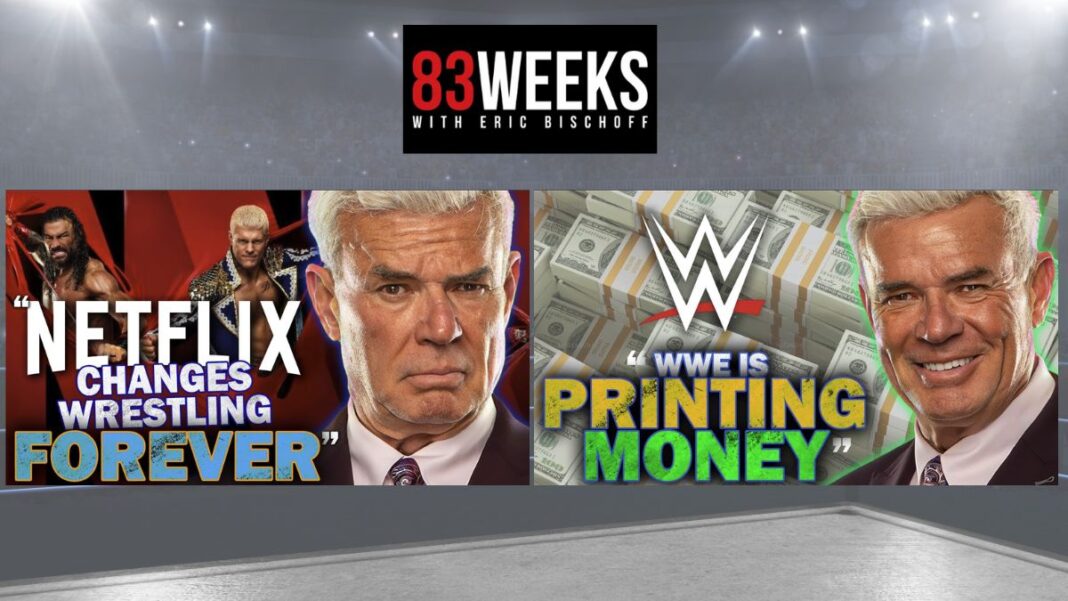Professional wrestling has experienced a few major booms throughout its history, including the one that is happening currently. The first two peaks date all the way back to the Gorgeous George days in the 1940’s and 50’s, followed by the Golden Era of wrestling with Hulk Hogan, ‘Macho Man’ Randy Savage and WrestleMania in the 80’s. Wrestling would experience its next major spike in interest in the mid-1990’s and the early 2000’s during the time period where Vince McMahon’s WWE had Monday Night Raw going up directly against WCW’s Monday Nitro created by Ted Turner and Eric Bischoff.
During this time, which became known as the Monday Night War, Bischoff was instrumental in creating the New World Order, or nWo, which featured Hulk Hogan turning from a baby face to a heel and joining Kevin Nash, Scott Hall and Sean Waltman in a faction that would go on to dominate the airwaves and the merchandise stands.
Bischoff is one of the most polarizing and controversial figures in professional wrestling history. He was instrumental in the creation of the New World Order, which played a major role in WCW’s success and peak during the Monday Night War.[86] Mike Johnson of Pro Wrestling Insider wrote: “His place in history is this and it will always be this – he’s the only person to come along and kick Vince McMahon hard enough that he forced WWF’s product to evolve and get better. No matter whether he won the ratings for 83 weeks or one week, his legacy is that he made pro wrestling change for the better in the mid-1990s.”
Monday Nitro debuted in September 1995 and starting in June 1996, the show overtook Raw in the ratings for 83 straight weeks, hence the name of Bischoff’s weekly podcast he hosts with ‘The Podfather’ Conrad Thompson.
Today, wrestling is in a place few can even believe when it comes to popularity and the amount of television time and money that is involved both in the United States and otherwise. Last January it was announced Netflix entered into a 10-year, $5 billion agreement with the WWE for the rights to WWE Raw in addition to the deals the company has with the USA Network for Smackdown. Additionally, All Elite Wrestling signed a four-year contract towards the end of 2024 believed to be worth around $170 million per year.
When asked if he is surprised by where things are today with wrestling and the television contracts, Bischoff replied, “Profoundly. So much has happened within the business of the wrestling business over the past five years, that I don’t think it’s really settled in yet just how profound some of this evolution has become. We haven’t even caught up to technology yet as a society, as a culture. Technology is evolving quicker than our ability to adapt to it and fully understand it.
“So not only is technology just moving at the speed of light, but entertainment is also changing at the same time. So, the convergence of those two realities makes everything that’s happening seem even more amazing. One of the reasons I get a kick out of it is because wrestling has always reflected the culture, sometimes in comedic, parody type ways. But also, it’s such an evolution of where we are as a culture, because entertainment really does drive culture in more ways than people realize.”
Bischoff was inducted into the WWE Hall of Fame in 2021 for his “innovation behind the scenes and his memorable performance in front of the camera.” In addition to his many years within wrestling, Bischoff ran a television production company and was also involved in video game production with Jason Hervey, best known as the actor who played Fred Savage’s brother on The Wonder Years.
Bischoff said wrestling not only has an advantage as a television product but also as a live event. “I think our culture is becoming, even though we’re more technologically connected, we’ve become socially so disconnected. And there are just not that many opportunities for us to do what we’re wired to do, which is commune, watch a concert together, go to a football game together, go to a soccer game together. And the more technologically connected we become, I think the more valuable live event experience has become, because it’s the only place you can get a real connection.”
Overall, Bischoff sees wrestling today just doing what it has always done, which is draw an audience for television. Working under Ted Turner, who Bischoff called, “the Elon Musk of his day,” he saw the SuperStation use professional wrestling to build an audience for other products.
“If you read about Ted’s approach to creating the SuperStation, professional wrestling comes up early in that conversation. Ted knew then what we’re seeing today, even with Netflix, is if you have a live event product that the people relate to, you can use that to build your audience. It was Ted’s own words. One of the pillars that he built the SuperStation on was professional wrestling, partly because it’s all he could afford, and also because he knew he could build an audience from it.
“If I can get them to come watch wrestling, then I can sell them Andy and Mayberry. If I can get them to watch wrestling, I can use that to promote an old movie. And it’s the same thing Netflix is doing. They’re using the loyalty of the wrestling audience, because it’s been demonstrated over decades in the television industry. It’s amazing, but I’ve seen this movie before.”
Bischoff pointed out that before cable television, pro wrestling would get higher ratings than just about any programming in most major markets. Then, it became a staple of cable programming, followed by becoming a major player in pay-per-view events.
He added, “When digital started exploding in the 90s, and websites, what’s still to this day one of the largest websites in the world? Professional wrestling. It’s always been on the cutting edge. It’s fascinating to me.”
Since April 2018, Bischoff and Thompson have documented Bischoff’s career in wrestling each week on 83 Weeks, one of the top podcasts in the wrestling space. Bischoff has made various appearances in wrestling over that time, but mostly has been on the outside looking in. He said he does miss the creative process and would just like to see the inner workings of it today.
“I would just love to be a fly on the wall and watch the creative process because I think it’s a much more disciplined, functional process. And you can tell by the stories, they’re tighter, the attention to detail, the little nuances in the way stories are being presented, down to a certain look at a certain time and the guy in the truck knows it’s coming, the talent knows it’s coming. Those little things make all of the difference in the world, and I love watching that.”
Barrett Media produces daily content on the music, news, and sports media industries. To stay updated, sign up for our newsletters and get the latest information delivered straight to your inbox.

Dave Greene is the Chief Media Officer for Barrett Media. His background includes over 25 years in media and content creation. A former sports talk host and play-by-play broadcaster, Dave transitioned to station and sales management, co-founded and created a monthly sports publication and led an ownership group as the operating partner. He has managed stations and sales teams for Townsquare Media, Cumulus Media and Audacy. Upon leaving broadcast media he co-founded Podcast Heat, a sports and entertainment podcasting network specializing in pro wrestling nostalgia. To interact, find him on Twitter @mr_podcasting. You can also reach him by email at Dave@BarrettMedia.com.









